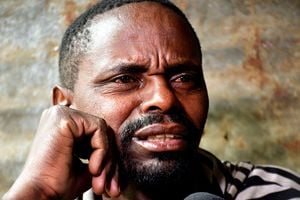How Bill seeks to make protests painful

Police officers arrest protestors outside I&M Building along Koinange Street on June 18, 2024.
What you need to know:
- Bill seeks to give state powers to clamp down on Kenyans expressing democratic right.
- Leaders have warned that the Bill seeks to impose unnecessary restrictions in freedom.
Kenyans could soon find themselves behind bars if a proposed legislation to regulation on picketing in the country is passed by Members of the National Assembly.
The introduction of the Assembly and Demonstration Bill, 2024 sponsored by Mbeere North MP Geoffrey Ruku (DP) seeks to give state sweeping powers to clamp down on Kenyans expressing their democratic right as provided in the constitution through public protests.
The Bill seeks to provide the conduct of an assembly or demonstration, providing the prohibitions during the event, which include imposing conditions relating to public order, safety and protection of freedom of persons.
The Bill, which has already elicited mixed reactions from Kenyans seeks to repeal sections 5 and 6 of the Public Order Act Cap 56 and give police officers sweeping powers to prevent demonstrators from going to a different locations or from deviating from the route specified in their notice of demonstration.
“A person who contravenes the provisions of the conduct of the assemblies or demonstrations commits an offense and shall on conviction be liable to a fine not exceeding 100,000 or to imprisonment for a period not exceeding one year or both,” reads part of the Bill that has caused uproar among Kenyans.
Apart from the proposed punitive fine, demonstrators will be slapped with, the Bill proposed a more tedious process to seek permission from the regulating officer, which includes three days prior notice and not more than 14 days to the event.
“The principal of the Bill is to provide legal framework for regulation of assemblies and demonstrations. The Bill seeks to give effect to the provisions of Article 37 of the constitution,” reads part of the part.
Unnecessary restrictions
Leaders have warned that the Bill seeks to impose unnecessary restrictions in freedom to assemble and demonstrate peacefully as guaranteed in Article 37 of the constitution.
Article 37 of the constitution on assembly, demonstration, picketing and petition provides: “Every person has the right, peaceably and unarmed, to assemble, to demonstrate, to picket, and to present petitions to public authorities.”
Mr Ruku’s Bill provides that a person intending to hold an assembly or demonstration shall notify the regulating officer in advance.
The organisers’ are required to provide full names and physical address as well as they who will control the demonstrators.
This includes providing powers to the regulating officer to impose conditions on carrying out of an assembly or demonstration and such conditions may relate to public safety, maintenance of public order or the protection of the rights and freedom of person.
It also delegates power to the Cabinet Secretary to make regulations limit fundamental rights and freedoms and better carry out the law.
In the wake of the past incidence where regional police bosses or county officers have banned demonstrations at the last minute, despite prior notice, the Bill could be seeking to take back the people right to assemble.
Peaceful protests
Case in point, the Tuesday Nairobi protests dubbed ‘OccupyParliament’ where the Law Society of Kenya (LSK) called out Nairobi region police commander Adamson Bungei who had allegedly instructed officers under his command to interfere with the peaceful protests organsied by Kenyans outside Parliament Building over the Finance Bill.
“We condemn the outright contempt by the police to outlaw the protests guaranteed under the constitution, resulting in running battles and use of teargas on protestors. This is despicable and affront to the rule of law,” faulted LSK president Faith Odhiambo.
“We are shocked that Mr Bungei on a folic of his own has ignored a notification of the protest from organizers under the guise of lack of form.”
Similar incidence was witnessed in Mombasa county where the demonstrations took place against the finance Bill.
Surprisingly, although the draft of the proposed law has been in the works, the timing is quite telling at a time Kenyans are agitating for the review of the controversial Finance Bill, 2024 presently being debated in the Second Reading.
Also, it begs the question why the sponsor of the Bill has decided to lock out the senate’s input, indicating that it does not concern counties.
Not taking the legislative process lightly, Busia senator Okiya Omtatah has kicked of the debate, questioning the intent of the sponsor to limit Kenya democratic right to express themselves though protests as provided for in Article 37 of the constitution.
“Public awareness is the key to constitutional sanctity. Let’s remain vigilant and involved in the process as stipulated in law,” urged senator Omatatah.





